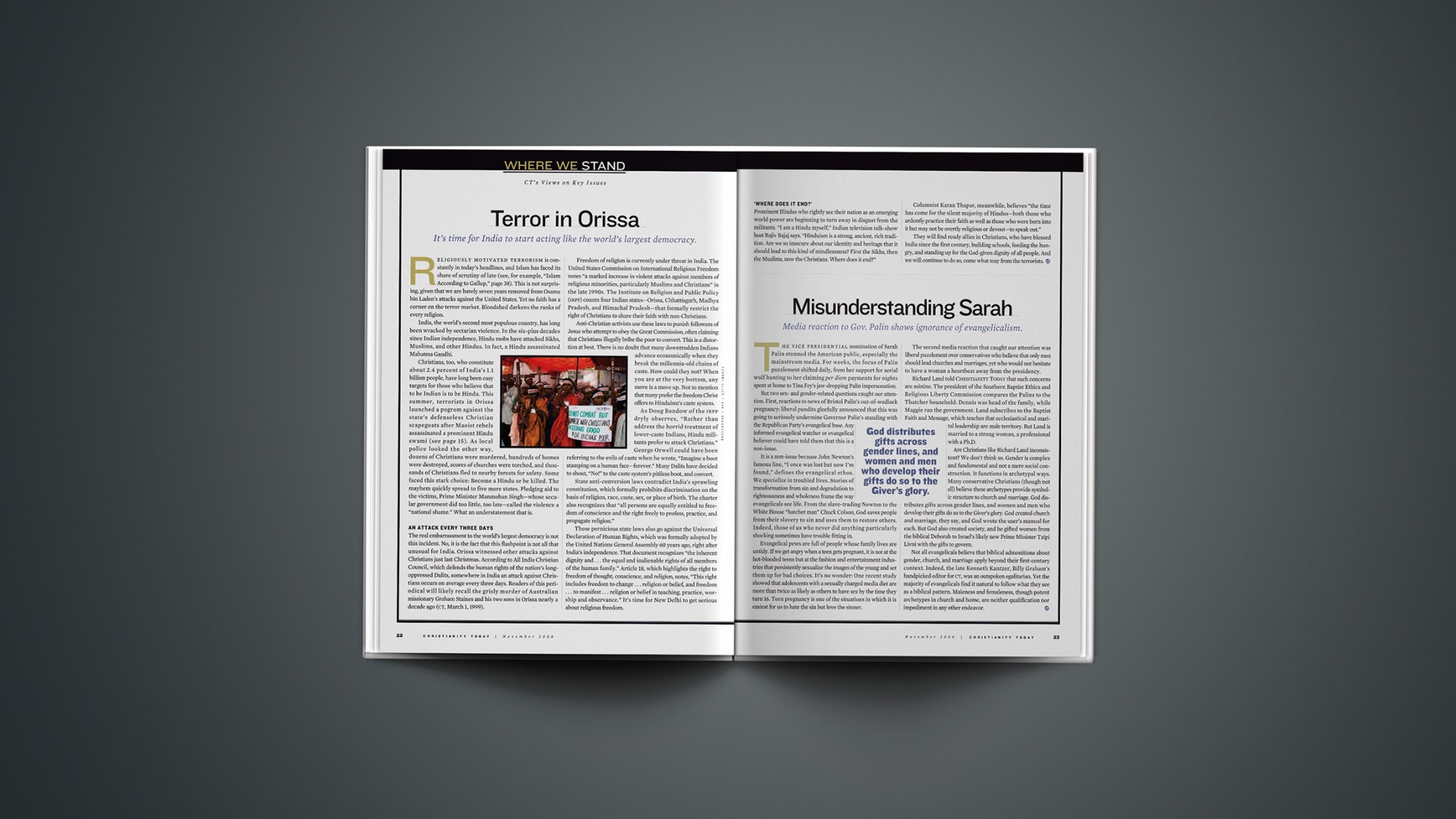The Vice Presidential nomination of Sarah Palin stunned the American public, especially the mainstream media. For weeks, the focus of Palin puzzlement shifted daily, from her support for aerial wolf hunting to her claiming per diem payments for nights spent at home to Tina Fey’s jaw-dropping Palin impersonation.
But two sex- and gender-related questions caught our attention. First, reactions to news of Bristol Palin’s out-of-wedlock pregnancy: liberal pundits gleefully announced that this was going to seriously undermine Governor Palin’s standing with the Republican Party’s evangelical base. Any informed evangelical watcher or evangelical believer could have told them that this is a non-issue.
It is a non-issue because John Newton’s famous line, “I once was lost but now I’m found,” defines the evangelical ethos. We specialize in troubled lives. Stories of transformation from sin and degradation to righteousness and wholeness frame the way evangelicals see life. From the slave-trading Newton to the White House “hatchet man” Chuck Colson, God saves people from their slavery to sin and uses them to restore others. Indeed, those of us who never did anything particularly shocking sometimes have trouble fitting in.
Evangelical pews are full of people whose family lives are untidy. If we get angry when a teen gets pregnant, it is not at the hot-blooded teens but at the fashion and entertainment industries that persistently sexualize the images of the young and set them up for bad choices. It’s no wonder: One recent study showed that adolescents with a sexually charged media diet are more than twice as likely as others to have sex by the time they turn 16. Teen pregnancy is one of the situations in which it is easiest for us to hate the sin but love the sinner.
The second media reaction that caught our attention was liberal puzzlement over conservatives who believe that only men should lead churches and marriages, yet who would not hesitate to have a woman a heartbeat away from the presidency.
Richard Land told Christianity Today that such concerns are asinine. The president of the Southern Baptist Ethics and Religious Liberty Commission compares the Palins to the Thatcher household: Dennis was head of the family, while Maggie ran the government. Land subscribes to the Baptist Faith and Message, which teaches that ecclesiastical and marital leadership are male territory. But Land is married to a strong woman, a professional with a Ph.D.
Are Christians like Richard Land inconsistent? We don’t think so. Gender is complex and fundamental and not a mere social construction. It functions in archetypal ways. Many conservative Christians (though not all) believe these archetypes provide symbolic structure to church and marriage. God distributes gifts across gender lines, and women and men who develop their gifts do so to the Giver’s glory. God created church and marriage, they say, and God wrote the user’s manual for each. But God also created society, and he gifted women from the biblical Deborah to Israel’s likely new Prime Minister Tzipi Livni with the gifts to govern.
Not all evangelicals believe that biblical admonitions about gender, church, and marriage apply beyond their first-century context. Indeed, the late Kenneth Kantzer, Billy Graham’s handpicked editor for CT, was an outspoken egalitarian. Yet the majority of evangelicals find it natural to follow what they see as a biblical pattern. Maleness and femaleness, though potent archetypes in church and home, are neither qualification nor impediment in any other endeavor.
Copyright © 2008 Christianity Today. Click for reprint information.
Related Elsewhere:
Previous Christianity Today editorials can be found here.
For more politics coverage, see Christianity Today‘s campaign 2008 section and the politics blog.










